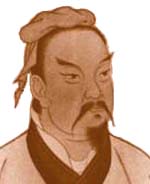Reviews
China in Disintegration?Joseph A Tainter. The Collapse of Complex Societies. Cambridge 1988
Picking up on a previous discussion about the possibility that the failure of cities would produce depopulation in their hinterland, with specific reference to Galilee, a possibility for which Tainter's book was cited in support, the following was posted to the ANE-2 list on 5 June 2007.
Tainter defines collapse as loss of complexity. I think that definition needs a lot of work. But rather than engage those deep theoretical issues here, it may also be worth noticing how Tainter treats the ancient Chinese situation which is one of his examples. After all, any attempt to widen the reach of the Mediterranean disciplines, so as to include something of the larger human world, is to be encouraged in principle. Even if some corrections might be in order.
And some corrections are in order. First among them is that China in 0771 (the instance Tainter includes among his specimens of collapse) did not collapse. The overlord power Jou vanished as a factor in affairs, leaving behind it a perfectly viable if acephalous multi-state system. There was no starvation, no exodus, no wandering of peoples; there were no group suicides among the rural populace. What the Jou had provided was control, and what they had bled off was wealth. Once that control was removed, and once that wealth was left where it had originated, the local states flourished. As indeed seems to have been true for at least parts of the Roman Empire, a case which Tainter considers at greater length.
One has to side emotionally with the Chinese overlords before anything approaching a Chinese "collapse" can be posited for 0771. Evidently Tainter does take that side, but he has no business doing so. History is not whose side you are on; it is what happened. The example, therefore, does not belong in the book. The Rome example of "collapse" might be questioned, and it has been questioned by Glen Bowersock, who finds that Rome did not in fact collapse in the sense meant by Tainter. In both China and Rome, Tainter is meddling with history, which is not something he was trained for. It shows.
That is the short answer. For details, I repeat Tainter's summary of the Jou situation from p4-5 of his book, and intersperse a few remarks, in the interest of seeing how comparative history is currently done, and how it might be done better in the future.
TAINTER [p5-6]. "The Western Chou Empire." The Chou dynasty succeeded the corrupt Shang in the mastery of China by 1122 BC, . . .
BROOKS: It is not likely that the "corruption" or moral failure of Shang was the reason for its conquest by Jou. That theory of the transition is a self-serving Confucian myth. History needs to notice myth, but myth itself does not make good history. Tainter is being suckered out by standard tales and stories, and he does not seem to realize it. This does not get us off to a very good start.
TAINTER: . . . a reign was subsequently established that later Chinese looked back on as a golden age.
BROOKS: Certain Confucian theorists did so regard the Jou, for reasons beneficial to themselves. In the Warring States period (the immediate pre-Imperial period) there was actually a vigorous discussion about whether the Jou were a good or a bad model for those times. Lots of people thought that they were a bad model. This Tainter does not know. He is unaware of anything other than standard Confucian piety. Piety is not history, and concentration on pious viewpoints, to the exclusion of other viewpoints, is not historiography.
TAINTER: The Chou ruled through a feudal system, but within a few centuries their control began to slip. The royal house began to lose power as early as 934 BC. Barbarian invasions increased in frequency through the ninth and eighth centuries, and regional lords began to ignore their obligation to the Chou court.
BROOKS: It is hard to tell how far this departs from the Bad Last Woman topos (which holds that the last Jou ruler failed through his infatuation with his meddlesome wife). Taking these statements as true, however, for the sake of argument, notice what they imply. They imply a strengthening of the local states at the expense of the overlord, not a general loss of efficiency. The locus of power is changing, but China as a whole is not becoming either weak or inefficient.
TAINTER: In 771 BC the last Western Chou ruler was killed in battle and the capital city, Hao, overrun and sacked by northerners. Following this disaster, . . .
BROOKS: A disaster to the NW-located overlord, no doubt. But a boon to everybody else, in a process that seems already to have been headed in that direction. Feudal systems can fail in many ways, among them these two: either the overlord is so rapacious that he bleeds the underlords until the whole system becomes weak, or the overlord himself can weaken, in which case the underlords may well assert themselves. We have in China the latter scenario. Was the liberation of the South American republics from their Spanish overlords in the 1830's a disaster? Not for those republics. Was the liberation of Paris in 1944 a disaster? Depends who you talk to, but that event had Lucien Le Cam and Simone Signoret, to mention only two, dancing in the streets. This does not come across as the population mourning their lost overlords.
TAINTER: . . . the Chou capital was moved east to Loyang, where the Eastern Chou dynasty resided from 770 to 256 BC. The Eastern Chou, however, were powerless figureheads: Chinese unity effectively collapsed with the Western Chou.
BROOKS: True but tautological: all it says is that Jou control ended with the end of Jou control. Whether this was a collapse, or a geographical rearrangement that was the end of a process which had begun 150 years earlier, is a matter on which collapse theorists may wish to pause. Let it be emphasized in passing that the "unity" of the Jou-dominated states consisted chiefly in the fact that Jou dominated them. Considered in themselves, those states had different traditions, and in some cases spoke different languages. A certain cultural unity did gradually come into being after 0771, that is, after the end of Jou power. After three centuries, meaning, by the death of Confucius, the extent and importance of that cultural unity had become considerable. But cultural homogenization is a fact about the later multi-state system; it is not a fact about the previous Jou system.
TAINTER: Through the Spring and Autumn (770-464 BC) and Warring States (463-222) periods, disintegration and endless conflict were the norms.
BROOKS: Tilt. The feudal connection vanished with the feudal overlord, but that is not dis-integration in any real sense. It is one of the basic traits of feudalism (indirect sovereignty on a land/service basis) that the constituents are NOT integrated into a single state, but retain full local identity for all except tribute and military obligation purposes. Consider Anjou. Recall Burgundy. Feudalism is one way you can dominate an area when you are not strong enough to conquer and unite it. As for disintegration in the sense of civil breakdown, in the Chinese case, there is none. On the contrary, each of the the constituent states, minus its outside economic and military obligations to the Jou overlord, was more fully integrated than before. More itself, more free to pursue its own aims. Was Italy better off after the Austrians were ejected? Austrians may speak of a collapse, but what do the Italians think?
All that survives of this sentence, then, is the idea of endemic warfare. Is warfare itself a sign of collapse? That may need to be explored a little further.
TAINTER: Powerful regional states emerged which contended endlessly for hegemony, forging and breaking alliances, engaging in wars, and manipulating barbarian groups.
BROOKS: The bigger of the Jou underlord states asserted themselves regionally after 0771. So did the medium ones. The rest were overborne in about a century (the mid 0600's) by the big ones. As for alliances, in the sense of alliances, there were none in the post-Jou centuries. There were ad hoc agreements to campaign together, but these had no validity, and they were not expected to have validity, beyond the close of that campaign. They did not define ongoing alignments of states. Tainter's term "alliances" evokes a modern arrangement that has no parallel in early China.
This is not a merely intellectual error. A lot of practical, real-world damage has been done to European understanding of China through misreporting the facts of this period. The League of Nations was founded, in part, on an optimistic but erroneous notion that international law has existed in the post-Jou period. (For bibliography, see Walker). That theoretical model was untrue. And the League collapsed, if I may borrow that term, after about 2 years. The League was an untruth built on a misconception.
Mistakes are not only bad in themselves; they hurt other people. Sometimes they hurt whole states. It is better, both methodologically and morally, to read the sources more carefully, and get it right the first time. The real-world suffering may be less.
TAINTER: The contending states became fewer but larger, until finally the Ch'in reunified China in 221 BC.
BROOKS: Tilt. China had never been unified. Much of it had come under overlordship twice, first under Shang and then under Jou. The unification of 0221 was the first unification, an utterly new event. The title chosen by its leader ("First Emperor") was explicitly meant to symbolize this. There had never before been a single Chinese state comprising the whole Sinitic area. There had never been a previous emperor. I count it in Tainter's favor that he did not call the Jou rulers "emperors." But credit for that caution vanishes, after all, in his use of the drastically incorrect term "reunified."
The Chinese states in Spring and Autumn were like the Greek states, as well described by M I Finley. The Greek states, or a subset of them, had cultural commonality. They could unite against a major outside threat. (So could the Chinese states - in Spring and Autumn, the chief threat was the southern but non-Sinitic state of Chu, which only later became acculturated as a member of the Sinitic family). But the Greek states never unified politically, except temporarily with an assist from Persia, and permanently under Rome. The failure of the Greek states to do what the Chinese states did is one of history's interesting topics, but it belongs outside the present issue, and I ignore it here..
It was only with the tremendous reorganizations of the Warring States period, the formation of bureaucratic palace states, which enabled the larger of them to bring resources more singlemindedly to bear on the support of a modern army. The modern mass infantry army for the first time gave those states which could support it the power to destroy each other. That process of destruction is what happened next. The first of the new-style battles was fought in 0343. Chi was victorious in that battle, and the following year, the Chi ruler (previously a prince) assumed the Jou title "king," and began to renumber the years of his reign again from 1. At that point, the race to replace Jou as the dominant power went into high gear. It is this crucial restructuring of the state and its populace that Tainter is missing out on. For those who know, it may be thought to be implied in his phrase "fewer but larger." But the thing needs to be made explicit, and also to be made detailed. This is why "Spring and Autumn" and "Warring States" are usefully distinguished as two periods. The contentiousness is there in both periods, but only in the latter phase,the Warring States, does interstate contentiousness get enough teeth to kill.
TAINTER: The period of disintegration and conflict . . .
BROOKS: Tilt yet again. No matter how many times Tainter sticks in the word "disintegration," riding piggyback on the more correct word "conflict," there was no disintegration whatsoever. Tainter might defend that term if he takes the Jou view of the event of 0771, and if he confines his treatment to 0771, and then stops. But he does not. He goes on through several centuries, and throughout those centuries, the Chinese states were becoming constantly more powerful, and each of them did this precisely by integrating themselves. The great watershed occurs somewhere around 0500, and the new situation was fully in place by the mid 0300's. In place of a group of elite chariot warriors, the older form of the palace state, you had instead a virtually Napoleonic situation: a populace which was now part of the state, having access to (and being amenable to) the law. Law itself was a new phenomenon. There was also the new mass infantry army based on precisely these new social elements. That populace came to be loyal to the state as such, and this also was utterly new; the old palace states had functioned on the service ethos of the lifetime military elite, and the loyalty of the elite had been to the person of the ruler; the "state" as a concept did not exist. The new-style palace states instituted resource management and logistic considerations on a large scale: land surveys, tax ratings, agricultural loans paid back with a different set of measures, the whole package. Every man (farming or fighting, as one political theory manual of the time puts it), every woman (textile production), every plant (including some new introductions yielding more calories per calorie expended in cultivation), every inch of land, every dollop of fertilizer, was surveyed, inventoried, and turned into war material. If this is "disintegration," I puzzle to think what "integration" would look like.
So here again, into a statement that is otherwise not obviously false, Tainter has dragged in the entirely gratuitous term "disintegration." What he describes in that sentence is something which, on any close and reasonable appraisal, is the exact opposite of "disintegration." All Tainter can do with these centuries, apparently, is to mourn for the long lost Jou overlordship. It was the crumbling of that already weak Jou overlordship that uncorked the tremendous social energy latent in China as such. Those later years . . .
TAINTER: . . . produced some of China's major philosophical, literary, and scientific achievements.
BROOKS: "Scientific" might be pushing it. Let's say "technological." Philosophical and literary, sure. And why? For the same reason that Renaissance Europe was such a hotbed of civil and military technology, of political theory, and of philosophy and learning in general. These things arose despite a deep human aversion to change as such, and why? Because, in a competitive multi-state system, each state can see a potential competitive advantage in adopting changes. Warring States China and Renaissance Europe are one of the most attractive parallels that the planet offers to the alert comparative historian. Tainter is here walking past that opportunity with his hands in his pockets, mourning that which is not (Jou overlordship) and missing that which is (a dynamic system of increasingly integrated and increasingly powerful states). As an exercise in comparative history, Tainter's book is nugatory.
TAINTER. Confucius wrote during, and in reaction to, this era.
BROOKS: Not for a moment. Confucius was dead in 0479), well before the date at which Tainter begins the Warring States period (he likes 0463). Confucius wrote nothing at all, at any date; the idea that he did is a later cultural myth. The Analects, a daybook kept up by his successor school in Lu, did invent sayings of Confucius in order to address the new issues of the developing Warring States period. This is an interesting situation; I myself wrote the book on it (The Original Analects, Columbia 1998). Those who want to watch an integrating state in progress, and can decode some evidence which is anachronistically phrased, might like to take a look at it. There are no very hard words. Feel free.
TAINTER: Contending schools of philosophy (the "Hundred Schools") proliferated and flourished between 500 and 250 BC. In addition to many technical and economic developments, Chinese political thought in its classical form emerged during the worst of the breakdown (Creel 1953, 1970; Needham 1965; Levenson and Schurmann 1969; Hucker 1975).
BROOKS: Quibbles aside (there is some interesting Chinese stuff after 0250), this sentence is true except for the phrase which links it to Tainter's thesis. This was not "the worst of the breakdown," except for sissies who mind a little carnage going on around them. There was no "breakdown." There was an enormous increase in state power and effectiveness, and for that matter in personal wealth. Traders grew rich. Houses grew grand. A leisure culture developed. Some people at the time didn't like the way power was being used; some even wanted to opt out of the whole enterprise, producing a scatter of Fourierist communities across the landscape. But they are not the story. The story of China was written by the powerful states. The powerful states made history by devouring each other. Casualty figures in one battle were said to be more than 400,000. The number might be exaggerated, but the slaughter was undoubtedly fierce; states could emerge from one battle minus much of their previous land area and population count. As is said in the Art of War [a book of this period], war is the chief business of the state, and the state's only hope of survival. Only too true. And in response to that fact, the leading states of the period, until they went under altogether, did not collapse or weaken. They grew in power and efficiency, just like the states engaged in World War 2. Japan in 1945, after years of war, was technologically far ahead of Japan on the verge of war in 1937. So, unfortunately for Japan, was the US. So was England, so was Germany. So was everybody, more or less. War does that. War is the most efficient catalyst for technological advancement that was ever invented.
But all of this is rather far removed from the idea of "collapse," No?
As for the authorities on whom Tainter relies, they are a mixed lot. Levenson and Schurmann in particular is an odd performance, a history of early China by a man (Levenson; I don't know about Schurmann) who despises ancient history in general, and has no patience with the tools needed to get the history of any period out of the sometimes recalcitrant textual sources. For the case of Levenson, see the review of that book, elsewhere in this section.
There is nothing wrong with not knowing everything. As Confucius did not say, but as someone in a later century was clever enough to make him say: "to know when you know something, and to know when you don't know something; that is knowledge." This is a typical maxim of the expert period, the bureaucratic period, the period of the new specialist. But those who don't know something do need to take care about those on whose knowledge of that something they rely. Tainter doesn't show good judgement in his choice of information about China, nor does he display a very sound historical instinct of his own. The working historian needs at least one of those virtues.
So in the end we have a summary which is superficially recognizable as a digest of various Chinese bedtime stories and adult stereotypes. Not all of them are wholly without foundation. But the summary is lacking in historical precision and in analytical force. Funnily enough, it proves more or less the opposite of what it was meant to prove.
Well, the planet is young yet, and we of the East are nothing if not patient. Maybe next time.
E Bruce Brooks
Warring States Project
University of Massachusetts at Amherst21 Oct 2012 / Contact The Project





